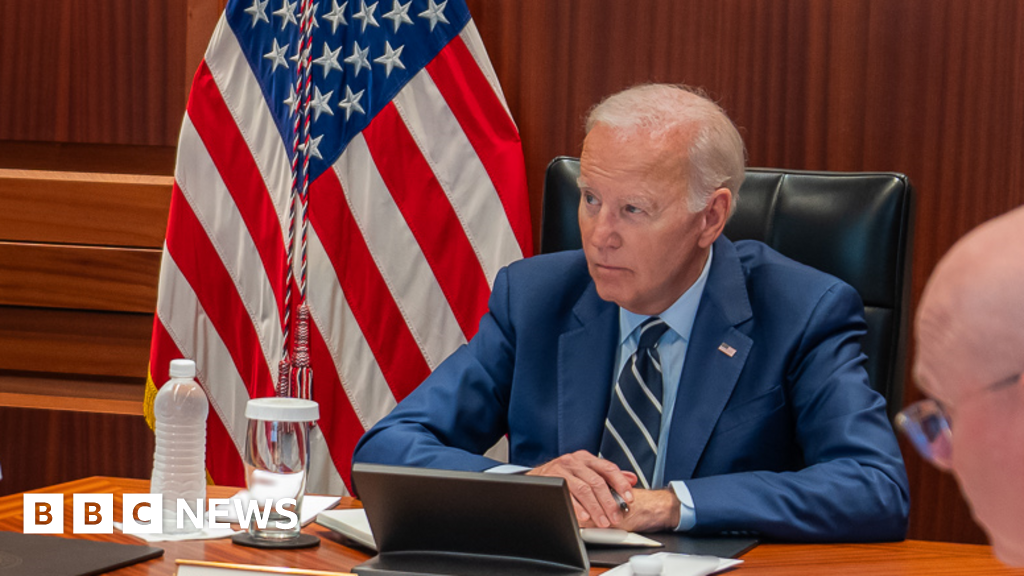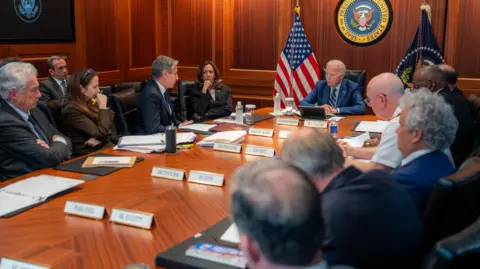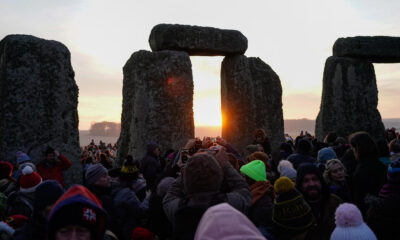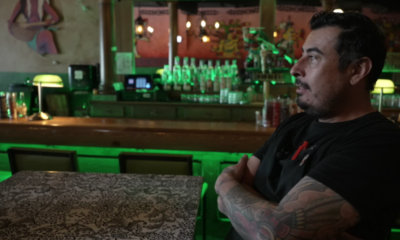News
Biden convenes national security team as fears of Iran attack grow

 White Home/ X
White Home/ XUS President Joe Biden met his senior nationwide safety staff on Monday as considerations of a attainable Iranian retaliatory assault on Israel grew.
Mr Biden mentioned he had been briefed on preparations to assist Israel ought to it’s attacked, whereas Secretary of State Antony Blinken mentioned officers have been working “across the clock” to forestall an escalation.
Tensions have risen during the last week following the assassination of Hamas’ political chief Ismail Haniyeh, for which Iran has blamed Israel and vowed “extreme” retaliation. Israel has not claimed accountability for the assassination.
Quite a few international locations, together with the US and UK, have additionally informed their residents to go away Lebanon, from the place it’s feared Hezbollah, an Iran-backed militia and political motion, may play a task in any response.
Throughout Monday’s briefing, Mr Biden was informed the timing and nature of an Iranian assault remained unclear, based on US information website Axios. A day earlier, Mr Blinken reportedly informed his G7 counterparts that Iran and Hezbollah may assault Israel inside 24 to 48 hours.
In a press release launched after the briefing, Mr Biden mentioned: “We acquired updates on threats posed by Iran and its proxies, diplomatic efforts to de-escalate regional tensions, and preparations to assist Israel ought to it’s attacked once more.”
He added that steps have been being taken to answer assaults on US forces “in a fashion and place of our selecting”. On Monday, a number of US personnel have been injured in a suspected rocket assault on a US army base in Iraq.
Chatting with reporters earlier within the day, Mr Blinken mentioned officers have been “engaged in intense diplomacy just about across the clock with a quite simple message: All events should chorus from escalation”.
“Escalation shouldn’t be in anybody’s pursuits. It would solely result in extra battle, extra violence, extra insecurity,” he mentioned.
He added {that a} ceasefire would “unlock prospects for extra enduring calm not solely in Gaza itself, however in different areas the place the battle can unfold”.
“It’s pressing that every one events make the suitable decisions within the hours and days forward,” he mentioned.
Earlier within the day, Mr Biden spoke to King Abdullah II of Jordan about “efforts to de-escalate regional tensions, together with via a direct ceasefire and hostage launch deal”, a press release from the White Home mentioned.
A joint assertion from the G7 additionally expressed “deep concern on the heightened degree of stress within the Center East which threatens to ignite a broader battle within the area”.
“No nation or nation stands to realize from an additional escalation within the Center East,” it mentioned.
Talks that had introduced renewed hope of a ceasefire deal to finish the battle in Gaza have faltered following the occasions of latest weeks.
On 27 July, 12 youngsters and youngsters have been killed in a strike on the Israeli-occupied Golan Heights. Israel accused Hezbollah of finishing up the strike, although Hezbollah denied any involvement.
Days later, Fuad Shukr, a senior Hezbollah army commander, was killed in an Israeli airstrike on a suburb of the Lebanese capital, Beirut. 4 others, together with two youngsters, have been additionally killed.
Hours later, Haniyeh was assassinated in Iran.
Iran’s Revolutionary Guard Corps (IRGC) mentioned Haniyeh was killed in a “sturdy blast” attributable to a “short-range projectile” fired from outdoors a home the place he was staying whereas visiting the capital, Tehran.
Palestinian President Mahmoud Abbas mentioned in an interview with Russian state information company RIA Novosti that the killing would have a “damaging impression on the continued negotiations”.
Israel has not commented on the assassination, however Israeli Prime Minister Benjamin Netanyahu mentioned afterwards that Israel had delivered “crushing blows” to Iran’s proxy teams in latest days.
Following the killings in Lebanon and Iran, the IRGC mentioned Israel would obtain a “extreme punishment on the applicable time, place and method”, whereas Hezbollah chief Hassan Nasrallah mentioned the battle had entered a “new section”.
It’s the closest the battle has come to escalation since April, when Iran fired some 300 drones and missiles at Israel in response to an Israeli strike on an Iranian consulate in Syria that killed plenty of senior army commanders.
Flights suspended
On Monday, Jordan requested all airways planning to land at its airports to hold an extra 45 minutes’ price of gasoline, a transfer considered a precaution in case Jordan has to shut its airspace within the occasion of a regional battle.
German flag service Lufthansa has suspended all flights to Tel Aviv, Tehran, and Beirut till and together with 12 August.
US airline Delta has additionally paused flights to Tel Aviv till at the very least 31 August “as a consequence of ongoing battle within the area”.
The UK Overseas Workplace at present advises in opposition to all journey to Lebanon and has urged British residents within the nation to go away.
It additionally advises in opposition to all journey to the northern space of Israel that shares a border with Lebanon.
The battle in Gaza started following the 7 October assault on Israel by Hamas and different militant teams, which noticed round 1,200 folks killed and one other 251 taken again to Gaza as hostages.
For the reason that launch of Israel’s retaliatory floor invasion in Gaza, greater than 39,600 Palestinians have been killed, based on the Hamas-run well being ministry.
Hezbollah and Israeli forces have additionally exchanged near-daily assaults because the battle started, with lots of of individuals killed and hundreds displaced on either side of the Israel-Lebanon border.
Hezbollah and Hamas are each backed by Iran and type a part of what Iran calls the “axis of resistance”, a unfastened alliance of militant and political teams throughout the area that oppose Israel and its key ally, the US.
-

 News4 weeks ago
News4 weeks agoMichael Vick says he will be the new head football coach at Norfolk State : NPR
-

 News4 weeks ago
News4 weeks agoMufasa: The Lion King – six key things to know before watching the prequel | Ents & Arts News
-

 News4 weeks ago
News4 weeks agoMichael Vick to become Norfolk State’s head football coach
-

 News3 weeks ago
News3 weeks agoHow ‘A Complete Unknown’ Brings Bob Dylan’s 1960s New York Back to Life
-

 News4 weeks ago
News4 weeks agoToday is the winter solstice and 2024’s shortest day. Here’s what to know about the official start of winter.
-

 News4 weeks ago
News4 weeks agoVancouver Canucks Recall Linus Karlsson And Phil Di Giuseppe, Send Mark Friedman And Arturs Silovs To Abbotsford
-

 News3 weeks ago
News3 weeks agoDenver chef brings new culinary twist to Mexican American pozole traditions
-

 News3 weeks ago
News3 weeks agoWill Smith’s Superhero Dream Is Realized As He Becomes Wakanda’s Protector In MCU Concept Trailer
